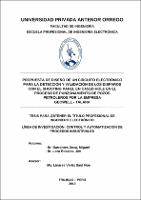| dc.contributor.advisor | Linares Vértiz, Saul Noe | |
| dc.contributor.author | Barrantes Deza, Miguel | |
| dc.contributor.author | Lora Rosales, Jim | |
| dc.creator | Barrantes Deza, Miguel | |
| dc.date.accessioned | 2019-05-06T14:14:15Z | |
| dc.date.available | 2019-05-06T14:14:15Z | |
| dc.date.issued | 2019 | |
| dc.identifier.uri | https://hdl.handle.net/20.500.12759/4750 | |
| dc.description.abstract | El presente estudio cuyo propósito está orientado en la detección y validación de
los disparos o baleo en el proceso de punzonamiento de los pozos petroleros. Los
ingenieros de campo al momento de realizar el proceso de punzonamiento lo
visualizan a través de un amperímetro el cual está ubicado en el shooting panel,
éste les indica cuando se realizó el baleo, pero también puede reaccionar sin
necesidad de que el cañón se haya detonado.
Con la elaboración del siguiente diseño del Circuito Electrónico va a detectar y
validar las detonaciones mediante unos sensores, los cuales van a poder captar la
vibración ocasionada por dicha detonación o baleo, de igual modo se sabrá con
precisión si se dio o no la detonación en el proceso de punzonamiento de los pozos
petroleros, así el ingeniero a cargo de la operación estará completamente seguro
de que se realizó con éxito y no fue un falso contacto, sin necesidad de esperar a
sacar la herramienta del pozo para comprobar si se hicieron o no los disparos, lo
que ahorraría con ello tiempo, trabajo y materiales. Un disparo bien reportado
posibilitará el flujo de los hidrocarburos. | es_PE |
| dc.description.abstract | The present study aims at the detection and validation of shots or bullet in the
process of punching of the oil wells. The field engineers at the moment of carrying
out the punching process visualize it through an ammeter which is located in the
shooting panel. It indicates when the shot was taken, but it can also react without
the cannon having been detonated.
With the development of the following design of the electronic circuit that will detect
and validate the detonations by means of sensors, which will be able to capture the
vibration caused by that detonation or shooting, in the same way it will be known
with precision whether the detonation occurred or not in the process of punching the
oil wells, so the engineer in charge of the operation will be completely sure that it
was carried out successfully and it was not a false contact, without the need to wait
to take out the tool from the well to check if shots were fired or not, which would
save time, labor and materials. A well-reported shot will slow down the flow of
hydrocarbons. | en_US |
| dc.description.uri | Tesis | es_PE |
| dc.format | application/pdf | es_PE |
| dc.language.iso | spa | es_PE |
| dc.publisher | Universidad Privada Antenor Orrego | es_PE |
| dc.relation.ispartofseries | T_ING.ELECT_843 | |
| dc.rights | info:eu-repo/semantics/closedAccess | es_PE |
| dc.rights.uri | https://creativecommons.org/licenses/by/4.0/ | es_PE |
| dc.source | Universidad Privada Antenor Orrego | es_PE |
| dc.source | Repositorio Institucional - UPAO | es_PE |
| dc.subject | Detección | es_PE |
| dc.subject | Validación de disparos | es_PE |
| dc.title | Propuesta de diseño de un circuito electrónico para la detección y validación de los disparos con el shooting panel en Csed Hole en el proceso de punzonamiento de pozos petroleros por la empresa Geowell - Talara | es_PE |
| dc.type | info:eu-repo/semantics/bachelorThesis | es_PE |
| thesis.degree.level | Título Profesional | es_PE |
| thesis.degree.grantor | Universidad Privada Antenor Orrego. Facultad de Ingeniería | es_PE |
| thesis.degree.name | Ingeniero Electrónico | es_PE |
| thesis.degree.discipline | Ingeniería Electrónica | es_PE |
| dc.subject.ocde | https://purl.org/pe-repo/ocde/ford#2.11.00 | es_PE |
| renati.type | https://purl.org/pe-repo/renati/type#tesis | |
| renati.level | https://purl.org/pe-repo/renati/level#tituloProfesional | |
| dc.publisher.country | PE | es_PE |


